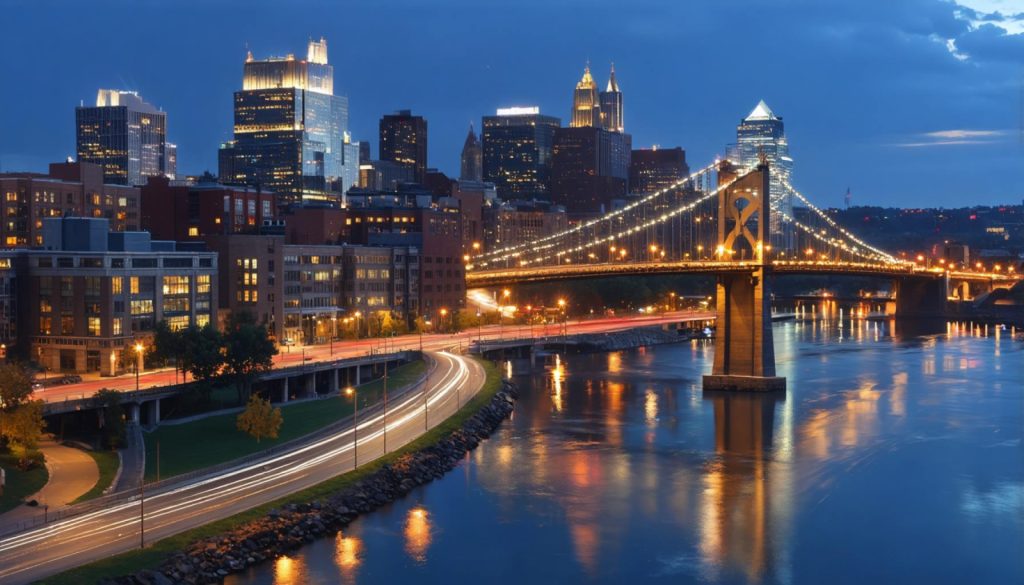
- Pittsburgh is experiencing a transformation driven by advances in artificial intelligence (AI) and robotics, shifting from its steel industry roots to a tech innovation hub.
- Carnegie Mellon University plays a central role in this transformation, nurturing startups and contributing to technological growth.
- East Liberty, termed “AI Avenue,” is the focal point for AI companies, hosting over 25 firms and signifying Pittsburgh’s tech potential.
- The AI Strike Team, led by Jay Katarincic and Joanna Doven, aims to invigorate Pittsburgh’s economy through AI, emphasizing collaboration across sectors.
- An ambitious plan involves repurposing the Homer City coal plant into a natural gas-powered AI data center, supported by Governor Josh Shapiro.
- Hellbender, an AI company, is expanding in Pittsburgh, focusing on community impact and veteran employment.
- Pittsburgh faces challenges in turning AI research into economic growth and job creation, requiring commitment and strategic efforts.
Pittsburgh stands on the precipice of a technological transformation, driven by the extraordinary advances in artificial intelligence and robotics. Known for its historic steel mills, the city now pulses with the energy of innovation and ambition—a 21st-century metamorphosis. This sweeping change is orchestrated in the hallowed halls of Carnegie Mellon University, a sanctuary of trailblazing research nurturing a swarm of startups. Yet, despite these seeds of innovation, Pittsburgh has seen its economy lag, and job markets sag, shadowed by the imposing successes of neighbors like Ohio.
Amidst the city’s historic brick, the spark of AI innovation is now most visibly settling in East Liberty—in a zone affectionately dubbed “AI Avenue.” It’s here that the kinetic pulse of progress finds its beat. From the spirited offices of Duolingo, a global leader in language education apps, to the sprawling presence of Google at Bakery Square, East Liberty is the nucleus of a nascent tech revolution. Over 25 AI-centric companies call this area home, each a testament to Pittsburgh’s potential—and a harbinger of its future.
Jay Katarincic and Joanna Doven, spearheads of Pittsburgh’s nascent AI Strike Team, embody the city’s aspirations. Their mission is more than rhetoric; it’s a clarion call to business, academia, and government, uniting these forces with a singular focus: invigorating Pittsburgh’s economic landscape through AI. Their resolve is buoyed by a spirit of collaboration, which they believe can unfurl a tapestry of new jobs and burgeoning business investments.
The masterstroke of Pittsburgh’s burgeoning AI sector may well be the audacious plan to repurpose the defunct Homer City coal plant. Investors envision this site reborn—a $10 billion natural gas powerhouse fueling expansive AI data centers. Pennsylvania Governor Josh Shapiro sees this repurposing as a keystone moment, leveraging the state’s energy assets in a bold bid for influence in the AI industry. It’s a defiance of geographical odds, straddling two eras—past industrial might fueling upcoming tech ascendancy.
In this landscape of renewal, Hellbender—an AI titan—plans its expansion within the city’s tech corridor. The company’s commitment to employing veterans underscores a community-focused ethos, promising 75 to 100 new jobs. Such initiatives exemplify the potential synergy between AI innovation and economic rejuvenation, weaving social responsibility with cutting-edge technology.
However, the promise of tomorrow does not come without its challenges. Transforming AI and robotic research into economic fortresses requires unwavering strategy and herculean efforts. Hurdles remain, demanding Pittsburgh’s brightest minds and boldest leaders rise to the challenge.
Pittsburgh is not merely aiming to transform itself; it seeks to carve a legacy, to pivot from its storied industrial past to a future defined by digital prowess and economic vitality. The steel city intent on reinvention faces a pivotal moment. Its future is no longer forged by fire but shaped by innovation, aspiring to lead the tech revolution and rewrite its narrative—one algorithm at a time.
Pittsburgh’s AI Renaissance: Transformation, Opportunities, and Challenges
The Burgeoning AI Ecosystem in Pittsburgh
Pittsburgh is undergoing a significant transformation, transitioning from its historical identity as the “Steel City” to becoming a thriving hub for artificial intelligence (AI) and robotics. This shift is primarily driven by the groundbreaking research at Carnegie Mellon University and the cluster of AI startups in East Liberty, Pittsburgh’s “AI Avenue.”
Expanding AI Footprint
1. East Liberty as the AI Nucleus:
– East Liberty, home to over 25 AI-centric companies, is a burgeoning tech district within the city. Companies like Duolingo and Google’s presence at Bakery Square signify a significant tech industry footprint.
2. Investment in Innovation Centers:
– The plan to repurpose the Homer City coal plant into a $10 billion natural gas facility powering AI data centers underscores the business strategy to leverage local resources for technological advancements.
3. Veteran Employment Initiatives:
– Hellbender’s expansion plan, focusing on hiring veterans, highlights efforts to integrate community-building with technological progress, aiming to create 75 to 100 new jobs.
Pressing Questions and Industry Insights
How Are Challenges Managed in Pittsburgh’s Tech Transformation?
– Economic Transition:
– Despite the promising developments, economic revitalization requires robust strategies to overcome hurdles like infrastructural upgrades and the competitive job market.
– Sustainability and Energy Use:
– Transforming coal plants for AI infrastructure must balance economic benefits with sustainability concerns. Emphasizing cleaner energy sources could align with broader environmental goals.
Market Forecasts and Industry Trends
1. AI Industry Growth:
– The global AI industry is expected to grow exponentially, with predictions indicating the U.S. could capture a significant market share. Pittsburgh’s investments position it favorably in this growth trajectory.
2. AI Applications in Workforce Development:
– Companies are increasingly implementing AI in workforce strategies to streamline operations, indicating potential growth in job categories like data analysis, AI systems management, and hardware maintenance.
Actionable Recommendations
– Enhance Public-Private Partnerships:
– Strengthening collaboration between government bodies, academic institutions, and private companies can foster a more cohesive strategy for growth and innovation in Pittsburgh’s tech landscape.
– Focus on Skill Development:
– Introducing targeted AI and tech skill programs in local universities and training centers will ensure a workforce ready to meet new demands, thus attracting more businesses and investors.
– Encourage Sustainable Practices:
– Promoting sustainable energy initiatives for AI enterprises can attract businesses conscious of their environmental impact while benefiting from innovative technologies.
Future Predictions and Opportunities
Pittsburgh stands at the cusp of a tech-driven renaissance, offering ample opportunities for businesses and individuals. By capitalizing on existing assets and addressing its economic and environmental challenges, the city can firmly establish itself as a leader in the AI revolution, fostering a vibrant tech economy and inspiring other cities to follow suit.
For more information on Pittsburgh’s technological advancements and educational initiatives, visit the official websites of local institutions like Carnegie Mellon University: Carnegie Mellon University.
Conclusion
Pittsburgh’s journey towards becoming an AI powerhouse is a testament to the city’s resilience and forward-thinking ethos. Embracing innovation while addressing challenges head-on, Pittsburgh is poised to redefine its legacy in the 21st century, with AI at its core.



